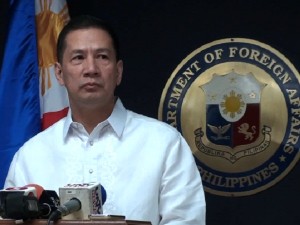Manila protests Beijing’s plan to deploy military garrison in West Philippine Sea
MANILA, Philippines—The Department of Foreign Affairs (DFA) on Tuesday said the country has filed a protest over China’s reported plan to deploy a military garrison on a group of disputed islands in the West Philippine Sea (South China Sea).
“The Philippine government has expressed its grave concern and registered its strong protest over the Chinese government decision to establish a military garrison on Woody Reef,” Raul Hernandez, DFA spokesman, said in an interview with reporters.
DFA’s move came a day after Beijing announced it would establish a military garrison on a group of disputed islands in the West Philippine Sea, which will most likely provoke further tensions with its neighbors.
The troops will operate from Sansha in the Paracel Islands, one of two archipelagos in the West Philippine Sea that are claimed by both China and Vietnam.
The garrison, approved by the Central Military Commission, “will be responsible for the Sansha area national defense mobilization and reserve forces activities,” the defense ministry said on its website.
The ministry did not say when the garrison would be established, but the move to station troops on the Paracels is likely to provoke Hanoi’s ire.
Hernandez said that the said move by the Chinese move was a violation of the existing principles of the Declaration on the Conduct of Parties in the South China Sea, or DOC.
“We hope that China, as a responsible country, will exercise self-restraint in the conduct of activities that would complicate or escalate disputes and affect peace and stability in the region,” Hernandez said.
“DOC states that parties undertake to exercise self-restraint in the conduct of activities that would complicate or escalate disputes and affect peace and stability including, among others, refraining from action of inhabiting on the presently uninhabited islands, reefs, shoals, and other features and to handle these differences in a constructive manner,” Hernandez said.
The Philippines earlier filed a protest over China’s establishment of Sansha City based on its position that the Kalayaan Island Group was an integral part of Philippine national territory under the municipality of Kalayaan of the province of Palawan.
“For this reason, the Philippines does not recognize Sansha City and the extent of its jurisdiction, and considers recent measures taken by China as unacceptable,” Hernandez said.
Hernandez said that the protest was the 12th since the start of the stand-off between the Philippines and China over the Scarborough Shoal in April. He said that the protest was handed over to Chinese Ambassador to the Philippines Ma Keqing Tuesday morning.
Hernandez said that the country also filed a protest over China’s deployment of 29 fishing vessels, a cargo vessel, and two maritime ships near Kagitingan Reef and a People’s Liberation Army Navy (PLAN) ship with bow number 934 near Zamora reef, and described the Chinese actions as “intrusions,” and “measures to protect power over our Kalayaan Island Group.”
“The use of armed government vessels to escort fishing vessels that conduct non-fishing activities is a violation of Philippine territory and a violation of obligation of states under international law including United Nations Convention on the Law of the Sea (Unclos).
Hernandez maintained that Kagitingan Reef and Zamora Reef were within the Kalayaan Island Group and formed integral parts of the country’s territory.
He added that the diplomatic protests were filed based on reports from the Philippine Coast Guard (PCG), which he said had been monitoring the activities in the area.
The Philippine Daily Inquirer had earlier reported that China last week sent its biggest fishing expedition in recent years to the disputed Spratly islands to assert its economic dominance on the entire West Philippine Sea, parts of which are claimed by the Philippines, Vietnam, Malaysia, Brunei and Taiwan.
When pressed by reporters on why the country was only limiting itself to resorting to diplomatic protests, which they said was seemingly ignored by China, Hernandez said that they wanted to address the issue in a “peaceful, diplomatic and legal matter.”
“You know the protests are very important even though they don’t immediately reap benefits for us because that way we are able to tell the world that we don’t accept such activities done by the other side on our territory and on the maritime domain that we should be enjoying given international law and given provisions of Unclos,” Hernandez said.
Hernandez said that they had been asking China to respect the Philippines’ sovereignty rights in areas in Scarborough Shoal and other features in the West Philippine sea and that they would continue to file protests for as long as there are violations.
He added that they would continue their three-track political, diplomatic and legal approaches in handling the dispute. He said part of these was their efforts in trying to get the support of the Association of South East Asian Nations (Asean) to be able to resolve the issue.
Asean on Friday released a statement detailing the six-point principles and their unified stand on certain aspects of West Philippine Sea disputes, including a restated agreement to solve them peacefully.
The statement came after vigorous lobbying by Indian Foreign Minister Marty Natalegawa.
A July 13 meeting of the Association of Southeast Nations broke up without a joint statement for the first time in 45 years because members could not agree on how to refer to China’s behavior in the disputed waters. The countries are drafting a “code of conduct” to try to overcome the rift.
When asked about how Filipino citizens could help in the issue, Hernandez said that he supported President Benigno Aquino III’s call for the country to have “one voice” over the issue.
“The President was saying there are so many voices in our society. We don’t have one voice and we should have a united voice so that it could be heard not only by China but by the International Community as well,” Hernandez said.















